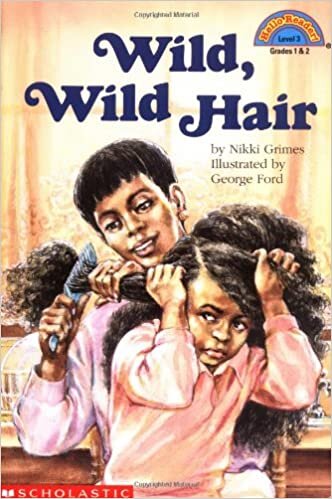Black Woman Changed | Long and Thick and Wild
Chimamanda Ngozi Adichie, a renowned Nigerian author and feminist advocate, once stated, “I am a bit of a fundamentalist when it comes to black women’s hair. Hair is hair – yet also about larger questions: self-acceptance, insecurity and what the world tells you is beautiful” (Adeola).
Like Adichie, I used to struggle with my Black hair and the deeper meanings/questions it raised for me. I used to feel different and uncomfortable with my Black braids when I was surrounded by girls with straight, flowing hair. My feelings drastically changed in the first grade when I purchased the book Wild, Wild Hair by Nikki Grimes and illustrated by George Ford for about $5.00 (sold currently for around $15.00 on Amazon) at my school’s Scholastic Book Fair.
In the short, rhyming children’s book, the main character is a little Black girl named Tisa Walker. She has “long and thick and wild” hair (Grimes 1). Tisa is a child who loves going to school but dreads one part of her weekly morning routine in preparation for it—getting her hair braided. Tisa decides to hide in different places around her home in order to avoid this portion of getting ready and her family members who call her to come do her hair. Tisa finds a few unique places to hide in her home, however, she is eventually “caught” by her mother who, when having found her daughter, simply states to Tisa, “Let’s go. It’s time to do your hair” (Grimes 9). Tisa’s plentiful hair gets detangled and braided by her mother, and soon she is rocking a beautifully braided hairdo that she loves.
Having felt abnormal and discouraged among my peers with my natural black braids, I was so excited when I read this story about another Black girl who went through the same experiences as me. I also disliked waking up early in the morning to get my hair done; I also used to try and hide from my Mom and her comb in the mornings; I also felt dread in the pit of my stomach before (and as) my mother did my hair. But in the end, I would leave my mother’s “hair chair” with braided, wildly beautiful hair. The character, Tisa Walker, was a literary lifeline for the thick-haired, natural “nappy” little girl I was back then and still am today.
Nikki Grimes’ Wild, Wild Hair is wholly deserving of 5 out of 5 stars for excellence. I absolutely recommend this book to every parent, relative, or friend of a young Black girl who may feel uncomfortable with her natural hair and has not yet realized the specialness and magnificence of her own Black tresses.
Other books like Wild, Wild Hair are Amazing Grace by Mary Hoffman and Brown Sugar Babe by Charlotte Watson Sherman.
You can purchase a copy of Wild, Wild Hair here.
Works Cited
Adeola. “Thirty Black Women's Natural Hair Quotes.” Coils and Glory, 2018.
Grimes, Nikki. Wild, Wild Hair. George Ford, Scholastic Inc, January 1997.
